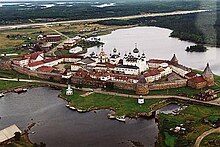Julia Nikolaevna Dansas
Julija Nikolajewna Dansas ( Russian Юлия Николаевна Данзас ; born March 9, 1879 in Athens ; † April 13, 1942 in Rome ) was a Russian historian , religious scholar , publicist , non-commissioned officer of the 18th Orenburg Cossack regiment and a Roman Catholic nun .
Life
Julija's mother Jefrosinja Argyropulos came from an old Byzantine aristocratic family , which in direct line to Emperor Romanos III. Agyros (968-1034) declines . The father was the first secretary of the embassy of the Russian Empire in Athens when Yulia was born in 1879 . Julija grew up in Athens. After her father's death in 1888, she moved with her mother and brother Jakob to their grandfather's estate near Kharkov in what is now Ukraine . There she delved into the works of French encyclopedists , historians of the 18th century, and Latin and Greek church fathers in the property's house library, which comprises 20,000 volumes . The family moved to Saint Petersburg , where Julija received private lessons. In 1896 she passed the final exam at the 6th Petersburg grammar school . Then she attended the Sorbonne in Paris to study history and philosophy. She dealt with theosophy , took part in spiritualistic seances and became a member of the Society for Psychical Research , which was devoted to the study of occult phenomena.
First World War
In 1905 Julija Dansas returned to Saint Petersburg. There she briefly became a member of the St. Petersburg Martinist Lodge founded by the Rosicrucian , esoteric and occultist Gérard Analect Vincent Encausse called Papus . There she published the book in 1906 with the title Claims of Thought , under the influence of Friedrich Nietzsche's philosophy . In 1907 she became lady-in-waiting to Empress Alexandra Feodorovna and headed the imperial chancellery for welfare. She became a staunch opponent of Grigory Rasputin . In 1909 she traveled to Italy and was received in a private audience by Pope Pius X. In 1913 she published her second book again under the pseudonym Jurij Nikolajew, entitled In Search of the Godhead . In 1914 she invited Adolf von Harnack as head of the Church Fathers' Commission to collaborate on the publication of Origen's writings .
The outbreak of the First World War prevented the meeting. She reported to the front and from 1914 to 1916 administered a field camp of the Red Cross with the Imperial Russian 10th Army . The excellent rider and saber fencer then served as a volunteer simple soldier in the 18th Orenburg Cossack Regiment. There she was promoted to sergeant and took part in combat operations. In 1917 she was offered command of a women's death battalion , which she refused.
Imprisonment
From 1918 to 1923 she worked as an assistant librarian in a library in Saint Petersburg, and she also taught the history of England and France at the 3rd Alexander Heart Institute. She was arrested on March 5, 1920, but released a day later at Maxim Gorki's intercession . In 1920 she met the exarch Leonid Fyodorov (1879–1935). In November she converted to the Russian Catholic Church of the Byzantine Rite . At that time this congregation in Saint Petersburg had 70 members. In September 1921 Julija founded a community of sisters and was ordained a nun on March 25, 1922 under the name Justina.
On November 18, 1923, she was arrested again as part of the trial against Russian Catholics, and in December she was transferred to Moscow to the Lubyanka and Butyrka prisons . On May 19, 1924, an OGPU revolutionary court sentenced her to ten years in prison for active membership in a counterrevolutionary association. In 1928 she was sent to the Solovetsky Islands prison . In January 1932 she was released early on Gorky's intervention.
Departure
In 1934, on payment of a sum of money and an obligation to maintain secrecy about the communist prison camp system, she was allowed to travel to Berlin to see her brother Jakob. In 1935 she entered the Dominican convent Prouille in southern France under the name Ekaterina . She now published regularly in the journal Russie et Chretiente, which she edited, on issues of Russian philosophy and intellectual history. She continued to criticize the Gnosticism and Manichaeism of Russian religious thought in the tradition of Vladimir Solovyov and the sophiology developed by Pawel Florensky and Sergei Bulgakow . From 1939 she lived in Rome, where she lectured at the Pontifical Collegium Russicum and other ecclesiastical institutions. At the suggestion of Cardinal Eugène Tisserant , she wrote the book Catholic Knowledge of God and Marxist Godlessness , in which she criticized Marxism from a Catholic perspective. The book went completely unnoticed.
Julija Dansas died in Rome in 1942. Most of her philosophical and religious studies work has been forgotten or has received no attention.
Important works
- Claims of thought , under the pseudonym Yuri Nikolayev, 1906
- In search of the deity , under the pseudonym Yuri Nikolayev, 1913
- Abelard von Solowki , under the pseudonym Solowecki Abeljar, 1928
- Bagne Rouge , Memories of Imprisonment in the Russian Gulag, 1935
- Catholic knowledge of God and Marxist godlessness , 1939
literature
- Michael Hagemeister: Danzas, Julija Nikolaevna. In: Biographisch-Bibliographisches Kirchenlexikon (BBKL). Volume 24, Bautz, Nordhausen 2005, ISBN 3-88309-247-9 , Sp. 253-258.
Web links
- Biography on nlr.ru (Russian), accessed March 21, 2009.
| personal data | |
|---|---|
| SURNAME | Dansas, Julia Nikolaevna |
| ALTERNATIVE NAMES | Данзас, Юлия Николаевна (Russian); Danzas, Yulia Nikolaevna |
| BRIEF DESCRIPTION | Russian historian, religious scholar, journalist |
| DATE OF BIRTH | March 9, 1879 |
| PLACE OF BIRTH | Athens |
| DATE OF DEATH | April 13, 1942 |
| Place of death | Rome |
